 Petzlover
Petzlover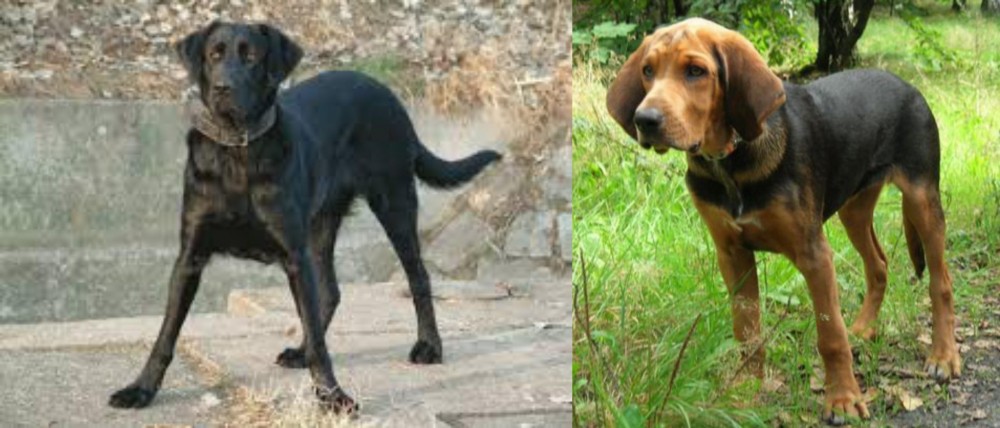 Cao de Castro Laboreiro is originated from Portugal but Polish Hound is originated from Poland. Both Cao de Castro Laboreiro and Polish Hound are having almost same height. Cao de Castro Laboreiro may weigh 38 kg / 84 pounds more than Polish Hound. Both Cao de Castro Laboreiro and Polish Hound has almost same life span. Both Cao de Castro Laboreiro and Polish Hound has almost same litter size. Cao de Castro Laboreiro requires Low Maintenance. But Polish Hound requires Moderate Maintenance
Cao de Castro Laboreiro is originated from Portugal but Polish Hound is originated from Poland. Both Cao de Castro Laboreiro and Polish Hound are having almost same height. Cao de Castro Laboreiro may weigh 38 kg / 84 pounds more than Polish Hound. Both Cao de Castro Laboreiro and Polish Hound has almost same life span. Both Cao de Castro Laboreiro and Polish Hound has almost same litter size. Cao de Castro Laboreiro requires Low Maintenance. But Polish Hound requires Moderate Maintenance
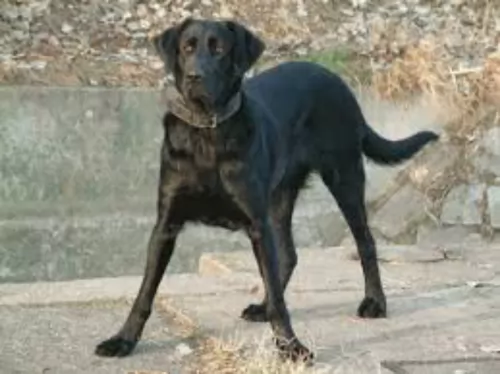 Cão de Castro Laboreiro originates from Portugal. Also known as the Portuguese Cattle Dog he was used long ago to guard livestock. Today, the modern Cao de Castro Laboreiro is descended from the molosser type dog.
Cão de Castro Laboreiro originates from Portugal. Also known as the Portuguese Cattle Dog he was used long ago to guard livestock. Today, the modern Cao de Castro Laboreiro is descended from the molosser type dog.
There are hints to the dog's origins from the 19th century, but changes in agricultural methods meant a disappearance of the dog as a livestock protector. Today the dog is mostly kept as a pet and was first seen at a dog show in 1914.
The Cão de Castro Laboreiro is recognized by the Fédération Cynologique Internationale as well as being recognized by the United Kennel Club in the United States.It is a rare dog and not many exist today but in Portugal, the USA and United Kingdom you will find a few breeders.
 It is thought that Polish Hounds descended from the Kostroma Hound. Other experts believe that the dogs were developed through crossbreeding of Bloodhounds with local Polish hounds.
It is thought that Polish Hounds descended from the Kostroma Hound. Other experts believe that the dogs were developed through crossbreeding of Bloodhounds with local Polish hounds.
The idea was to get a more lighter-boned, more athletic Bloodhound type of dog. In fact, this new standard was adopted in 1983 as the guide for the ideal Polish Hound.
The World Wars caused the numbers of these dogs to be drastically reduced, and attempts were made to revive the breed. The dog is rare outside his native country.
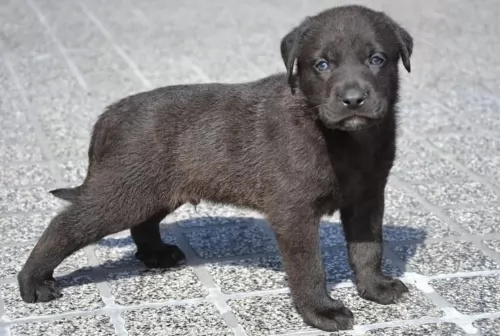 The Cão de Castro Laboreiro is a large dog, with height being in the region of 55 to 60cm and weight being in the region of 45 - 70kg. People describe the dog as wolf-like with a coat that is fairly short, thick and course. The coat is brindle with a base color of shades of grey, chestnut and black.
The Cão de Castro Laboreiro is a large dog, with height being in the region of 55 to 60cm and weight being in the region of 45 - 70kg. People describe the dog as wolf-like with a coat that is fairly short, thick and course. The coat is brindle with a base color of shades of grey, chestnut and black.
This large mastiff-type dog always has a black nose, his tail is long and carried high, but never curling over the back. He has a broad head and is much like the Labrador in looks, being free of wrinkles on the face.The ears of the Cao de Castro Laboreiro are medium-in-size and floppy while the eyes are dark brown.
The Cao de Castro Laboreiro makes an excellent pet as he forms strong bonds with his human family. He is territorial and makes an exceptional guard dog. He doesn’t particularly like strangers and is aloof around them.
This is an intelligent dog breed, he is strong-willed and stubborn, but when he is around the children in the family he is gentle and loving. When he has been trained and socialized, which is always highly recommended with every dog, he gets along with other pets in the home too.
 The Polish Hound is a nice, big, solid looking dog. He stands at between 55–65 cm in height and weighs between 20 to 32kg, both male and female. If you were to try and think of him, you could think of a Labrador/Beagle/Bloodhound mix.
The Polish Hound is a nice, big, solid looking dog. He stands at between 55–65 cm in height and weighs between 20 to 32kg, both male and female. If you were to try and think of him, you could think of a Labrador/Beagle/Bloodhound mix.
He is a medium to large sized dog. The coat is short to medium in length and is thick and hard with a soft, dense undercoat. The color of the coat is brown and tan and black and tan. The dog’s tail is set low and is thick and long.
This dog is a wonderful dog known to be clever and eager to please. He also has other attractive characteristics such as being energetic, gentle and he has an urge to protect his human family.
He is also loved because he is reliable and gentle around children who know how to treat dogs with respect. Some people who have owed this dog say that there is just one small fault – the dog’s bark – it is deep and mellow – and its why he isn’t suited to life in the city.
He is a rural dog, loving wide open spaces. It is why the dog will be an excellent pet if he is trained and socialized, becoming obedient and well balanced.
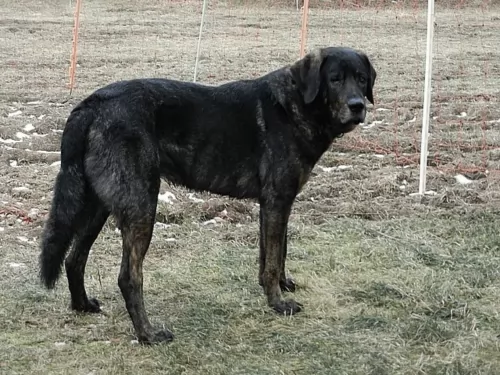 Environment and upbringing have plenty to do with how a dog turns out. People who just buy a dog for guardian purposes and nothing else can’t expect companionship in return.
Environment and upbringing have plenty to do with how a dog turns out. People who just buy a dog for guardian purposes and nothing else can’t expect companionship in return.
The Cão de Castro Laboreiro has always been a fearless guardian of livestock with his strong protective characteristics. He is intelligent and recognizes that a child in the family needs his protection.
This is a large dog who is strong, brave and intelligent but with his human family he is gentle, loving and loyal. Nonetheless he still requires a firm owner, and if you’re fair and firm with him you get the best with him. With this dog you can form a close friendship and bond.
 As a family pet, the Polish Hound just loves his human family, particularly when they are outdoor, active types. Your Polish Hound just loves spending time with his human family.
As a family pet, the Polish Hound just loves his human family, particularly when they are outdoor, active types. Your Polish Hound just loves spending time with his human family.
This is a wonderful dog as a family pet. More so when he has been trained and socialized. In exchange for the the wonderful companionship this dog offers you, you owe it to him to keep him happy and content.
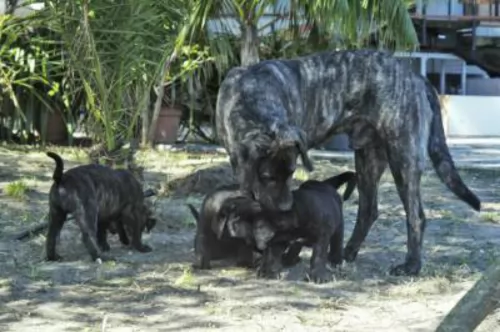 The Cão de Castro Laboreiro is generally a healthy breed, but even so, it is good to be aware of typical canine diseases that your pet may develop.
The Cão de Castro Laboreiro is generally a healthy breed, but even so, it is good to be aware of typical canine diseases that your pet may develop.
There are many eye problems that dogs have to contend with and if you see any kind of ulceration in your dogs eye, get veterinary advice.
A dog should always have access to a shady spot. Never ever leave your dog in a hot car. Heat builds up quickly and death can result soon as the body temperature rises.
Roundworm and tapeworm can infest dogs and you’ll need to speak to your vet about a worming program. Lice, mites and ticks are all parasites which attach themselves to the skin.
 The Polish Hound has a reputation for good health. That doesn’t mean you can just leave your pet. Good preventative healthcare is still vital if you want to prevent your pet being attacked by fleas, ticks, worms and mosquitoes.
The Polish Hound has a reputation for good health. That doesn’t mean you can just leave your pet. Good preventative healthcare is still vital if you want to prevent your pet being attacked by fleas, ticks, worms and mosquitoes.
You need to be careful with the Polish Hound because it's a deep chested dog, and these kinds of dogs are more prone to bloat. This is a deadly disease when the stomach twists and gas can’t escape. Untreated, bloat can be a killer. Take immediate action when you see your dog with a swollen stomach, restlessness and drooling.
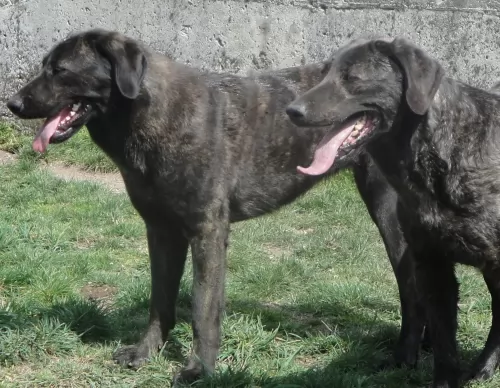 The Cao de Castro Laboreiro has a short coat which requires minimal grooming. Brushing him twice a week to rid him of loose hairs will suffice.
The Cao de Castro Laboreiro has a short coat which requires minimal grooming. Brushing him twice a week to rid him of loose hairs will suffice.
Nail clipping as well as ear- and teeth cleaning are other routine maintenance procedures for your pet.
The food you give your pet must be well-balanced and have protein and carbohydrates. If you want his skin and hair to remain healthy, vitamins, fatty acids and minerals will also be needed.
Boneless chicken and fish, brown rice and vegetables can be a good choice as well as some of the top quality commercially manufactured foods. An active dog will always need a higher protein content and therefore including raw meat into the diet is imperative – not every day as it can be very expensive, but every other day.
Remember that bones can be dangerous as they can splinter and cause your pet internal damage. Fresh, cool water must be available at all times.
 As a working dog, the Polish Hound is used to being busy and will be relying on you for a good dose of exercise. He loves the chance of a walk or a run and will be happy to run alongside you while you cycle or jog. Don’t forget ball games too.
As a working dog, the Polish Hound is used to being busy and will be relying on you for a good dose of exercise. He loves the chance of a walk or a run and will be happy to run alongside you while you cycle or jog. Don’t forget ball games too.
The thick coat of the dog will need to be brushed twice a week to remove all that loose hairs. He is a moderate shedder so the coat becomes dull if not regularly brushed.
During the brushing session, check your dog over for fleas and ticks, and any odd lumps that weren’t there before. Trim your pets nails if they don’t wear down naturally. This is a floppy eared breed, so you will need to check the inside of his ears for dirt, wax and bacteria.
Pay close attention to your dog’s teeth.Bad teeth can cause a lot of pain but also be very detrimental to your dog’s health.
Just like humans, dogs rely on quality food for good health and longevity. There are many good commercially manufactured dog foods, but avoid the ones with low quality ingredients as these can make your dog ill.
Check the ingredients-list carefully so that you can be sure your pet is getting the right balances of vitamins and minerals. Home-made food is also important as it is nutritious and tasty. You can add it into the dry kibble as a treat sometimes. The simpler the better as dogs don’t like spicy, exotic foods.
Boiled chicken, brown rice or pasta, sweet potatoes, spinach and carrot can be chopped up and given to your pet. Also try and include some raw meat as this is beneficial for health. Fresh, cool water must be made constantly available.